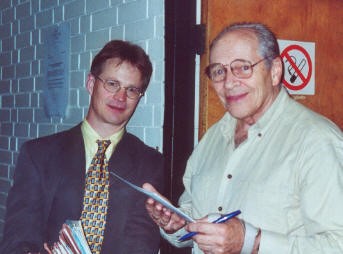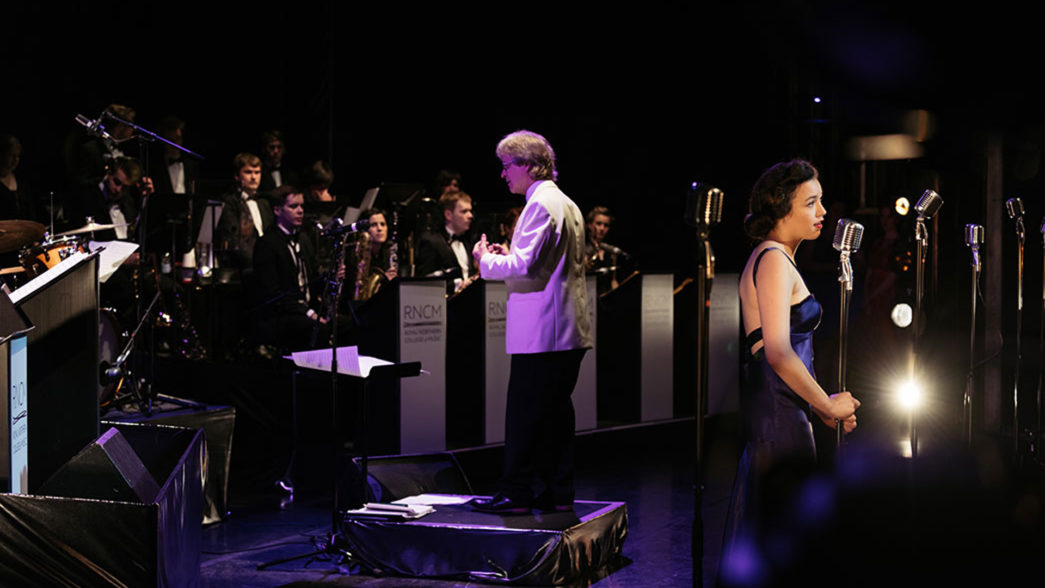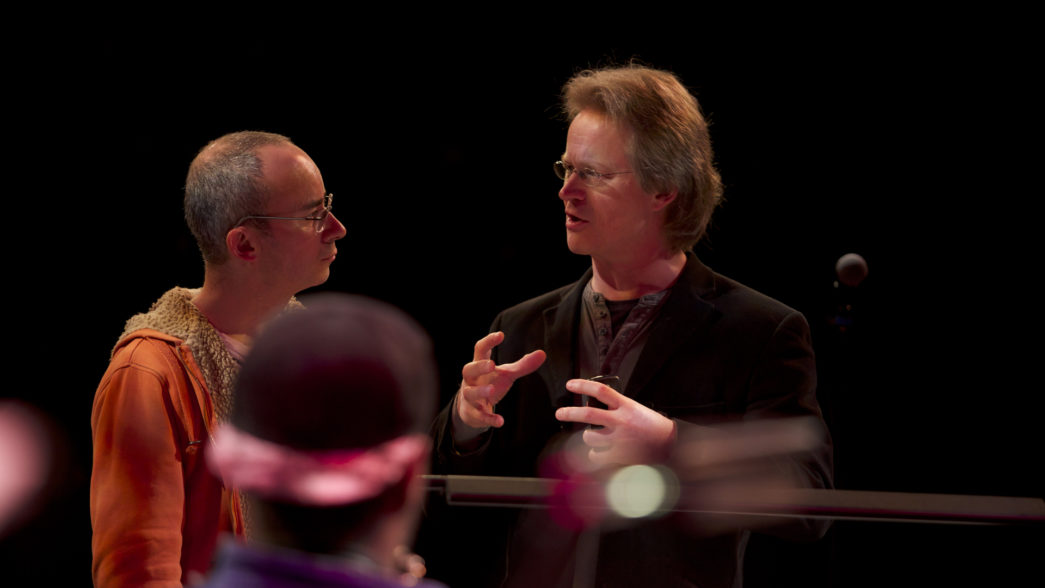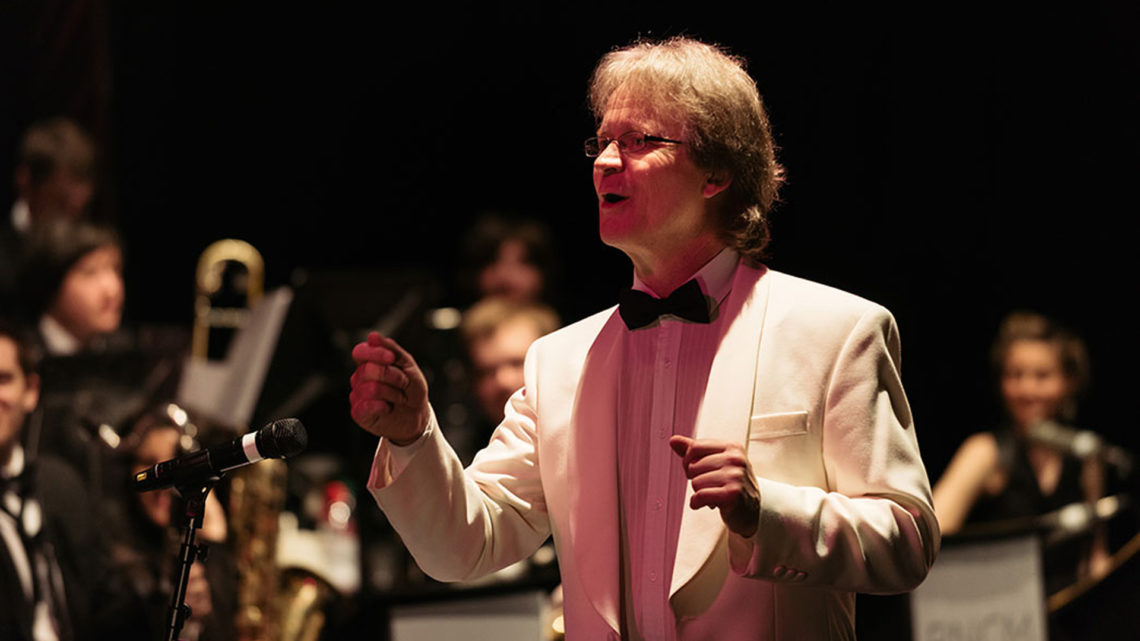Mike Hall: 20 glorious years of Big Band
As he prepares to take his final bow this evening, RNCM Big Band director Mike Hall reflects on 20 glorious years at the helm of one of our most popular ensembles.
What are you most proud of as RNCM Big Band director?
When I took on the Band in 1999 the format was to play about four full big band tunes per set and pad it out with small band tunes thrown together on the afternoon of the concert. We’ve developed this to the point that each concert is unique and has a really strong flavour of its own. This is often the result of a particular guest who’s brought their own music, but we’ve also played without a guest, focussing on one composer. Our loyal and supportive audience has come with us, sometimes taking a risk to try something new. I feel that the Big Band has helped to move jazz from being an almost ‘underground’ activity to a respected College ensemble.
Then there’s the adaptability of the students. Mastering the notes is only the first stage; applying the subtleties of stylistic awareness is sometimes more difficult. In our Benny Goodman Christmas concert, the Band actually sounded like the recordings by matching the quality of sound, attack and note lengths, the vibrato, and understanding nuances of the 1930s drum kit. I was really proud that night!
You’ve welcomed many guests over the past 20 years; do you have any favourites?
 It’s been the greatest thrill to work next to some of the true legends of jazz, especially the great saxophone players such as Bob Mintzer, Chris Potter, Tim Garland and Eric Marienthal. But the most personable, clever and generally inspiring guest has to be the late Sir John Dankworth CBE (pictured left). He worked with us three times and was like a loveable uncle. The last time he was with us we performed his suite The Zodiac Variations. I was aware that we only had 30 minutes of music for the second set, which worried me slightly. John wittily introduced each of the 12 tunes, often asking my opinion on something which led to a full-blown on-stage conversation between the two of us. The audience loved it and the set lasted well over an hour!
It’s been the greatest thrill to work next to some of the true legends of jazz, especially the great saxophone players such as Bob Mintzer, Chris Potter, Tim Garland and Eric Marienthal. But the most personable, clever and generally inspiring guest has to be the late Sir John Dankworth CBE (pictured left). He worked with us three times and was like a loveable uncle. The last time he was with us we performed his suite The Zodiac Variations. I was aware that we only had 30 minutes of music for the second set, which worried me slightly. John wittily introduced each of the 12 tunes, often asking my opinion on something which led to a full-blown on-stage conversation between the two of us. The audience loved it and the set lasted well over an hour!
I’ve also benefitted personally from working with some guests. In 2005 Pete Long (clarinet) featured on an Ellington Night. I played a short solo at his invitation, and a few weeks later he invited me to play with his Echoes of Ellington Orchestra for a full week at Ronnie Scott’s and to be featured on the famous Diminuendo and Crescendo in Blue. As you can imagine, I was in jazz heaven! This has been repeated numerous times since and I’m a featured soloist on his latest recording project, The Jazz Planets, a Strayhorn-style reworking of Holst’s famous work.
How important is an ensemble such as this to an RNCM student’s education?
Enormously important, a fact which I don’t believe is widely appreciated at the College. A classical music education gives students the discipline and ability to really understand how to play their instruments. But many of our students will not join professional orchestras or become soloists; they’ll work in areas like West End shows, sessions (such as film score orchestras), TV work and professional commercial big bands. Such playing requires a vast degree of stylistic versatility which is not part of the classical genre. The subtleties of swing, warm tone colours, the need for reed players to play flute and clarinet – our Big Band has helped to bridge this gap. To illustrate, Mark Nightingale, first call UK freelance trombonist and master jazz improviser who has worked with us several times, told me that when the London Symphony Orchestra is asked to record a film score, they often book him to lead the trombone section.
You used to be a civil engineer; when did you make the decision to teach music?
I started to learn clarinet at the age of 14, although I’d been playing tunes on the piano by ear from a much earlier age. My parents persuaded me against going to music college, so I studied civil engineering for four years at Heriot Watt University, Edinburgh. I was a musician by night and a transportation planning consultant during the day. My regular Wednesday night gig in a Covent Garden wine bar used to finish at 1am and I’d walk back to Waterloo to catch the ‘milk train’ home to deepest Surrey.
I attended several Wavendon Jazz Summer Schools as a student, which were very exciting but not always well organised. For my day job I was often sent on slick and professional courses dealing with everything from time management to data analysis and I felt sure that slickness could be effectively applied to jazz education.
Then in 1986 a good friend and fellow summer school student (who was also a full-time lecturer in the science of materials) suggested we put together and teach our own summer course, and in 1987 the first Manchester Jazz School was born. By 1993 the day job felt like it was disrupting my music making. I left it and took a one year postgraduate course at the RNCM. Stan Barker, the gentleman teaching jazz improvisation at the time, very unfortunately had a bad stroke two weeks before the end of the academic year… I covered for him and the rest is history!
What will you miss most about the RNCM Big Band?
The students; they’re very good, you know! They have the potential (with a little coaching) to play music which is much more difficult than your average local semi-pro big band should take on, which means I get the opportunity to be involved in the performance of cutting-edge music by the likes of Colin Towns, Maria Schneider, Bob Mintzer and Pat Metheny.
Also, the students can be very passionate about the music… the very music that I’m passionate about. I’d like to think it’s a two way process – they certainly help me to keep the faith!
Last few tickets available here for the 27 June RNCM Big Band concert..
27 June 2019




